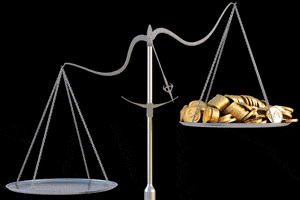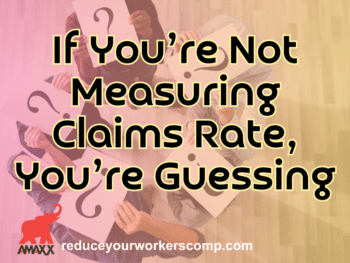
A basic principle of business solvency is to have an asset to offset each liability. A workers’ compensation claim is a legal obligation – a liability for the company, whether it is a contractually assumed liability through an insurance policy for an insurance company, or a retained liability through self-insurance. A claim reserve is an estimate of what the workers’ compensation claim will cost. When the adjuster handling the work comp claim establishes a reserve on the claim file, it is a definite amount of dollars that are being set aside to pay the future cost of the work comp claim.
Click Link to Access Free PDF Download
“How Do I Get My Adjusters To Follow My Account Handling Instructions?”
Under-Funded Liability Will Eventually Experience Shortfall
From an accounting standpoint, a claim is an incurred liability, even though it will be paid in the future. When the reserve is established by the adjuster, the company loses the ability to use the amount of money that has been set aside to pay the work comp claim. Inaccurate reserving, whether the reserves are excessive or inadequate, distorts the company’s financial condition. When the reserves are too high, money the company could use in other aspects of the business is no longer available for use by the company. When the reserves are too low, the company has an underfunded liability. This creates a situation where the company will eventually experience a shortfall.
While both over-reserving and under-reserving present an inaccurate picture of the company’s financial health, most financial people will argue that under-reserving is worse for the company. The reason for this is simple – the self-insured employer or the insurance company must have adequate reserves to meet their obligations. If the reserves are inadequate, the self-insured employer or the insurance company runs the risk of insolvency.
When the self-insured employer or insurance company has understated their reserves, they have overstated their assets and have understated their liabilities. The difference between the amount of assets an insurance company has and the amount of liabilities an insurance company has is referred to as the insurance company’s surplus. An insurance company’s ability to pay claims is evaluated by measuring its surplus in comparison to their outstanding obligations.
Evaluated By Ability To Pay Claims
Insurance rating firms like A.M. Best measure the financial stability of an insurance company by evaluating their ability to pay their claims. If the insurance company has understated their reserves, they may temporarily increase their financial stability rating, but when the claims come due (are paid) and the available surplus drops, the financial stability rating of the company will be downgraded. A downgrade in an insurance company’s financial stability rating results in fewer potential buyers of their insurance products because doing business with the downgraded insurance company is considered riskier.
An example of how under-reserving of work comp claims can impact the surplus is as follows (to simplify, the insurer has no other liabilities except claims).
Total assets Total Claim Reserves Total surplus
$10,000,000 $8,000,000 (under reserved) $2,000,000
$10,000,000 $9,500,000 (properly reserved) $500,000
In this example, when the reserves are understated, it appears the insurance company has a surplus of 20% of assets, but in actuality, the surplus is only 5% of assets.
Reserving Practices Subject to Audits
All jurisdictions regulate the financial stability of self-insured employers and insurance companies. The reserving practices of the self-insured employers and insurance companies are subject to periodical audits by the state insurance department or other state regulatory agencies. When the self-insurer or the insurance company is audited, if the reserves are inadequate to pay all open claims (and technically, all claims that have been incurred but not yet reported), the state insurance department will require the self-insured employer or insurance company to increase the reserves to cover their obligations on their claims. If the self-insured employer or insurance company does not have the assets available to place in reserve for those claims, the state insurance department will shut the company down.
Another aspect of under-reserving is the impact on the calculation of future premiums. The reserves on the open claims are a part of the calculations in establishing the loss experience of the company. If the loss experience is understated because the reserves are understated, the insurance company will be charging inadequate premiums, resulting in lower profits for the company, or even pushing the company quicker to insolvency.
Proper Reserving Is Essential
To accurately reflect the self-insured employer’s financial position or the insurers financial position, proper reserving for the claims is essential. Under-reserving impacts the financial stability of the company, as the shortfall in reserving will eventually be corrected by taking the shortfall from the company’s surplus. If you have any doubts about the adequacy of the reserves on your workers’ compensation claims, please contact us as we can recommend claim auditors that will verify the adequacy of your claim file reserves.

Author Rebecca Shafer, JD, President of Amaxx Risk Solutions, Inc. is a national expert in the field of workers compensation. She is a writer, speaker, and publisher. Her expertise is working with employers to reduce workers compensation costs, and her clients include airlines, healthcare, printing/publishing, pharmaceuticals, retail, hospitality, and manufacturing. She is the co-author of the #1 selling book on cost containment, Workers Compensation Management Program: Reduce Costs 20% to 50%. Contact:.
Contact: RShafer@ReduceYourWorkersComp.com.
Workers’ Comp Roundup Blog: https://blog.reduceyourworkerscomp.com/
©2019 Amaxx LLC. All rights reserved under International Copyright Law.
Do not use this information without independent verification. All state laws vary. You should consult with your insurance broker, attorney, or qualified professional.





























